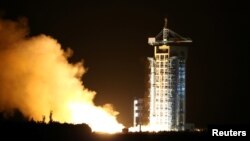China has launched the world's first satellite into orbit using a technology to send communications back to Earth that it hopes will be secure from hackers.
The satellite was launched into space Tuesday from a military base in Gansu province in the northwest Gobi Desert.
The 600-plus-kilogram satellite, dubbed Micius after a 5th century B.C. Chinese philosopher and scientist, will circle the Earth every 90 minutes.
Light particles will be fired at Micius to determine if quantum physics will permit the secure encryption of long-range communication.
The official Xinhua news agency said that during the satellite's two-year mission, it will establish "hack-proof" communications by transmitting uncrackable keys from space to ground.
"I don't think the quantum communications system is as impregnable as the Chinese would have us believe," Morris Jones, an independent Australian space analyst who monitors the Chinese space program, told VOA's Victor Beattie.
According to the Wall Street Journal, scientists in the U.S., Europe and Japan also are trying to exploit quantum physics technology, which can have military applications. But China has made the technology a top strategic focus in its five-year economic development plan released in March, and may have spent tens of billions of dollars in basic research.
Despite his belief that the technology is not impregnable, Jones said the application of it in space is a major step forward for the Chinese.
"The Chinese have one of the top space programs in the world, and they are still on an upward trajectory,” he said. “The Russians are stagnating and falling backward. If America does not regroup in the next five years, they will lose ground on China."
Jones predicts the U.S. space program could fall behind China's within the next 15 years if the U.S. does not commit more resources to space initiatives.
The lead scientist on the project, Pan Jian-wei at the University of Science and Technology of China in Hefei, said if this experiment is a success, China plans to launch a second such satellite within the next five years to develop a network based on the quantum technology.




